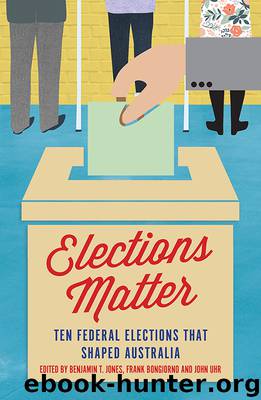Elections Matter by Bongiorno Frank

Author:Bongiorno, Frank
Language: eng
Format: epub
ISBN: 9781925523171
Publisher: Monash University Publishing
INTERIM: 1987–1996
John Howard’s dogged performance in the 1987 election was ultimately insufficient to allow him to retain the leadership of his party. His effort, during the bicentennial year of 1988, to shift the Liberals in a socially conservative direction through the Future Directions statement received some favourable reaction but also a good deal of criticism and even ridicule, much of it focussed on the nostalgic image of a family on the cover that was redolent of the 1950s. Some remarks in a radio interview that same year suggesting that the number of Asian immigrants arriving in the country might be more than could be readily absorbed by the Australian community seemed to further undermine his position.
In May 1989 his great rival of the era, Andrew Peacock, managed to regain the leadership in a party coup; Ian Sinclair lost the leadership of the National Party at the same time. But several of the coup-plotters then went on ABC television to provide the inside story of their overthrow of Howard, thereby immediately damaging the position of the new leader. The Liberal Party was also haunted through this period by the possibility – never realised – of a move into federal politics by John Elliott, one of the era’s leading businessmen and a major figure in Liberal Party affairs.
The Labor government entered one of its most adventurous periods of reform during the late 1980s, but in the context of a growing sense of unease within the community about the rapid nature of change. The government announced a big round of tariff cuts in 1988, and there was a revolution in the higher education sector, which included the reintroduction of student fees, intended to reshape it to meet Australia’s future economic needs. The Bicentenary of 1988 was an occasion for celebration and pride, but also for reflection on the legacies of colonialism, acting as a reminder that Labor’s performance in delivering justice to Aboriginal people was disappointing. Asian immigration remained contentious, as did immigration policy more generally, at the same time as Japanese investment produced over-blown rhetoric about economic domination. Environmental issues were increasingly salient.
The 1990 election signalled a critical shift in Australian electoral politics. No government before this time had managed to win a majority in the House of Representatives with a primary vote of less than 40%. But this was Labor’s achievement in the election, a result that the party had pursued frankly, especially through environmental policy, in the expectation that many disillusioned voters no longer prepared to give the government its primary vote would nonetheless offer a preference. The vote for minor parties such as the Australian Democrats and Greens and Independent candidates increased, but preference flows helped the ALP narrowly retain office. The Liberals’ performance in the election campaign was poor, reflecting somewhat the fractiousness of the coalition’s internal politics over the previous several years.
The politics of the early 1990s were shadowed by a deep economic recession and the intense rivalry between Bob Hawke, the prime minister, and Paul Keating, the treasurer.
Download
This site does not store any files on its server. We only index and link to content provided by other sites. Please contact the content providers to delete copyright contents if any and email us, we'll remove relevant links or contents immediately.
| Africa | Americas |
| Arctic & Antarctica | Asia |
| Australia & Oceania | Europe |
| Middle East | Russia |
| United States | World |
| Ancient Civilizations | Military |
| Historical Study & Educational Resources |
The Memory Code by Lynne Kelly(2403)
Schindler's Ark by Thomas Keneally(1890)
Kings Cross by Louis Nowra(1799)
Burke and Wills: The triumph and tragedy of Australia's most famous explorers by Peter Fitzsimons(1427)
The Falklands War by Martin Middlebrook(1386)
1914 by Paul Ham(1349)
Code Breakers by Craig Collie(1254)
A Farewell to Ice: A Report from the Arctic by Peter Wadhams(1250)
Paradise in Chains by Diana Preston(1248)
Burke and Wills by Peter FitzSimons(1239)
Watkin Tench's 1788 by Flannery Tim; Tench Watkin;(1232)
The Secret Cold War by John Blaxland(1213)
The Protest Years by John Blaxland(1208)
THE LUMINARIES by Eleanor Catton(1198)
30 Days in Sydney by Peter Carey(1161)
Lucky 666 by Bob Drury & Tom Clavin(1155)
The Lucky Country by Donald Horne(1142)
The Land Before Avocado by Richard Glover(1120)
Not Just Black and White by Lesley Williams(1087)
